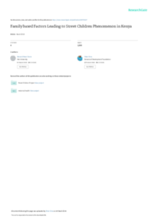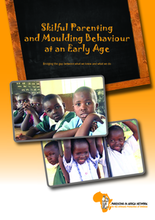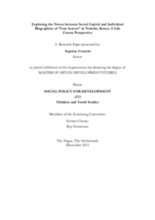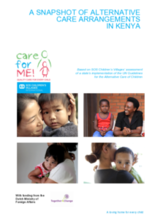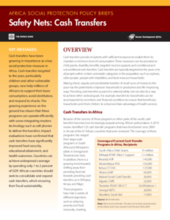This country page features an interactive, icon-based data dashboard providing a national-level overview of the status of children’s care and care reform efforts (a “Country Care Snapshot”), along with a list of resources and organizations in the country.
demographic_data
childrens_living_arrangement
children_living_without_bio
adoption
social_work_force
key_stakeholders
Key Stakeholders
Add New DataOther Relevant Reforms
Add New Datadrivers_of_institutionalisation
Drivers of Institutionaliziation
Add New Datakey_research_and_information
Key Data Sources
Add New DataChildren's Act, 2022 (Kenya)
Prevalence and number of children living in institutional care: global, regional, and country estimates
Social Protection and Disability in Kenya
Kenya Social Protection Sector Review
Country Care Review: Kenya
Child Developmental Disabilities, Caregivers’ Role in Kenya and Its Implications on Global Migration
Research findings on Alternative care system in Kenya for children without parental care
Charitable Children Institutions in Kenya: Factors Influencing Institutionalization of Children
Acknowledgements
Data for this country care snapshot was contributed by consultants with Maestral International.
Displaying 411 - 420 of 447
This paper is a culmination of various studies carried out by the authors and other researchers and seeks to specifically interrogate factors in the family system in Kenya, which contributes to children leaving homes to live on the streets.
This new study by Parenting in Africa Network (PAN) was conducted in three regions in Kenya (Nairobi, Mombasa and Busia), involving primary care givers of children age 0-8, children participating in Early Childhood Development and Education centers, and stakeholders and professionals involved in skillful parenting and early childhood development.
This study aims to determine the prevalence of maltreatment experienced by institutionalized children prior to their admission to Charitable Children's Institutions (orphanages) in western Kenya, and to describe their socio-demographic characteristics, reasons for admission, and the factors associated with prior experiences of maltreatment.
This study aims to determine the prevalence of maltreatment experienced by institutionalized children prior to their admission to Charitable Children's Institutions (orphanages) in western Kenya, and to describe their socio-demographic characteris
Employing a life course perspective and drawing upon care leavers' stories, along with focus group discussions and views from staff, this paper explores the concept of social capital and the ways in which this influences their lives before care, in care and after care.
This report presents findings from an assessment of Kenya's implementation of the UN Guidelines for the Alternative Care of Children.
The Child Protection System Guidelines were developed to address the fragmented response to child protection in Kenya and guide actors at the county level to deliver more coordinated and professional services for children and their families.
This policy brief from the World Bank provides an overview of cash transfers in African countries.
This paper combines qualitative research with three micro data sets and finds that the presence of urban basic services is importantly linked to child residence of migrant parents.
Research was conducted in five Rift Valley towns in Kenya in 2011 to understand the link between emergencies and the perceived increase of children joining the streets. Findings show that emergencies such as Post Election Violence and drought have caused children to join the streets. By far the biggest reason for children joining the streets was food insecurity. The authors advocate for an urgent, large-scale response to place children currently connected to the streets in durable situations in tandem with a multi-sectorial development approach to tackle and address the root of the crisis.

